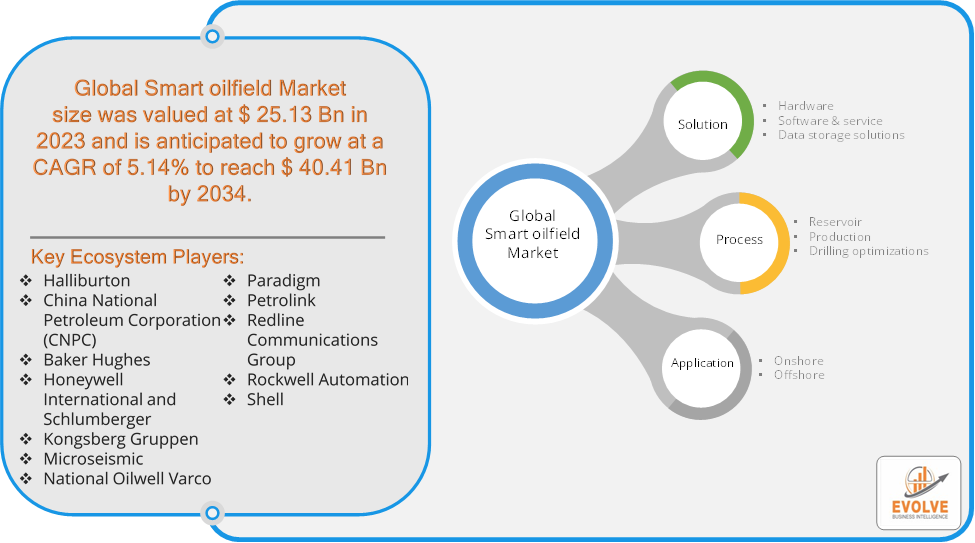Evolve Business Intelligence has published a research report on the Global Smart oilfield Market, 2024–2034. The global Smart oilfield Market is projected to exhibit a CAGR of around 5.14% during the forecast period of 2024 to 2034.
Evolve Business Intelligence has recognized the following companies as the key players in the global Smart oilfield Market: Halliburton, China National Petroleum Corporation (CNPC), Baker Hughes, Honeywell International and Schlumberger, Kongsberg Gruppen, Microseismic, National Oilwell Varco, Paradigm, Petrolink, Redline Communications Group, Rockwell Automation and Shell.
The Global Smart Oilfield Market is projected to be valued at USD 40.41 Billion by 2034, recording a CAGR of around 5.14% during the forecast period. A smart oilfield refers to an oilfield where advanced technologies, such as data analytics, sensors, automation, and real-time monitoring systems, are integrated to optimize oil and gas exploration, production, and management. The goal of a smart oilfield is to improve operational efficiency, enhance decision-making, and reduce costs and environmental impact.
This approach is sometimes referred to as digital oilfield or intelligent oilfield and is increasingly adopted to enhance productivity while managing the challenges of declining oil reserves and complex reservoirs.
Segmental Analysis
The global Smart oilfield Market has been segmented based on Solution, Process and Application.
Based on Solution, the Smart oilfield Market is segmented into hardware, software & service, and data storage solutions. The hardware segment is anticipated to dominate the market.
Based on Process, the global Smart oilfield Market has been divided into reservoir, production, and drilling optimizations. The production segment is anticipated to dominate the market.
Based on Application, the global Smart oilfield Market has been divided into Onshore and Offshore. The Onshore segment is anticipated to dominate the market.
Regional Analysis
The Smart oilfield Market is divided into five regions: North America, Europe, Asia-Pacific, South America, and the Middle East, & Africa. North America, especially the U.S., is one of the largest adopters of smart oilfield technologies. The region’s advanced technological infrastructure, high oil production (particularly in shale formations), and significant investments in digital transformation drive the adoption of smart oilfield solutions and the U.S. leads in innovation, particularly in automation, AI, and data analytics. With mature fields in places like Texas and offshore platforms in the Gulf of Mexico, the need for enhanced oil recovery (EOR) and cost optimization presents substantial opportunities for smart technologies. APAC is one of the fastest-growing regions in terms of energy demand, driven by rapid industrialization and population growth in countries like China and India. These nations are increasingly adopting smart oilfield technologies to maximize production from mature fields and complex offshore fields. Europe’s oil production is primarily concentrated in the North Sea, with Norway and the UK being key players. These countries are adopting smart oilfield technologies to manage mature offshore fields efficiently, using automation and digital monitoring to extend the productive life of assets and Europe’s focus on sustainability provides opportunities for smart technologies that reduce emissions and energy consumption. The integration of renewable energy sources with traditional oilfields is also emerging as a trend. Latin America is home to significant oil reserves, particularly in offshore fields in Brazil and Mexico. These countries are beginning to adopt smart oilfield technologies to boost production and optimize operations and Brazil’s offshore oilfields, particularly in the pre-salt layer, provide strong opportunities for deploying advanced technologies for deepwater exploration and production. Mexico, with its large oil reserves, is also investing in digital transformation.
